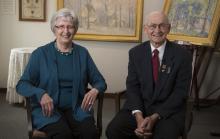Returning Home, Returning the Favor
Long-time Kansas philanthropists Gerald and Phyllis Greene each grew up on farms in different areas of the state — Gerald near Jewell, and Phyllis near Emporia. They met while Gerald was working towards his master’s in entomology at Kansas State University.
“We got married in time for her to type up my thesis,” Gerald said with a laugh.
After Gerald earned his Ph.D., the Greenes lived and worked in various places around the country before finally returning to Kansas in 1976 when Gerald was offered a job in Garden City with the K-State Southwest Research-Extension Center.
In the mid-1990s, talk about starting a community foundation in Garden City was circulating. A friend encouraged the Greenes to get involved with what would become the Western Kansas Community Foundation (WKCF).
“Becoming involved with the community foundation, we began to understand the importance of leaving a legacy where you live, rather than see those dollars leave the area permanently. I was very impressed with that kind of an opportunity,” Gerald said.
“People comment to me that their kids are going to get a lot of their money. My response is that my kids have done well, and they will do as well or better than we have. So our kids have no problem with us donating through the foundation and helping others.”
“We began to understand the importance of leaving a legacy where you live, rather than see those dollars leave the area permanently. I was very impressed with that kind of an opportunity.”
– Gerald Greene
The Greenes were big supporters of the WKCF’s participation in the GROW I program offered by the Kansas Health Foundation. This opportunity offered matching dollars for donors who set up permanent funds with the foundation and helped build endowments that would offer grants back to nonprofits and charities within the community.
“One of the reasons for being part of a community foundation is that you’re pooling your money with other people’s money, which in the end will make the impact a lot bigger,” Phyllis said.

 Print Page
Print Page
